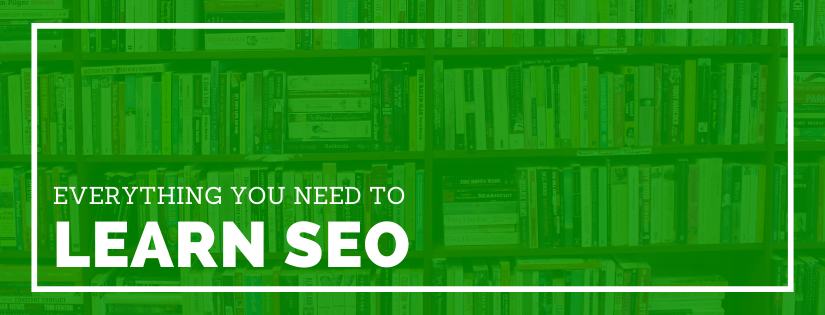The idea of SEO can be overwhelming in the beginning. The internet is flooded with free marketing resources. And though it’s great to have so much knowledge available, going through countless articles can be daunting and it’s hard to know which are trustworthy. To make it simple, I’ve outlined the SEO basics you should know to get started. And, I’ve identified the SEO guides to follow to dive deep into the key tactics you’ll need to learn SEO.
What is SEO?
The first and most important thing to learn is what SEO actually is. SEO is an acronym for “Search Engine Optimization”. Moz defines SEO as “the practice of improving and promoting a website to increase the number of visitors the site receives from search engines.” Basically, SEO is meant to improve your website rankings in search engines and ideally receive more website traffic in return.
Now that we know the meaning of SEO, let’s define some other jargon terms you might come across when learning about SEO.
Commonly Used SEO Jargon
Algorithm
According to Google an algorithm is “a process or set of rules to be followed in calculations or other problem-solving operations, especially by a computer.” Where SEO is concerned, an algorithm refers to the rules a search engine uses to rank websites.

Crawler
“Crawler” is a generic term used to describe programs that automatically run to scan websites. The crawlers are sometimes referred to as “robots” or “spiders”. A crawler discovers websites by crawling from one link to another. Google’s main crawler is called Googlebot and Bing’s main crawler is called Bingbot.
Keyword
Keywords or keyphrases are the query terms people enter in the search engine to try and find a web page or site to match their search intent.

Organic
Search engines have two types of result listings, paid and organic. The organic results are the free listings which you rank for naturally.
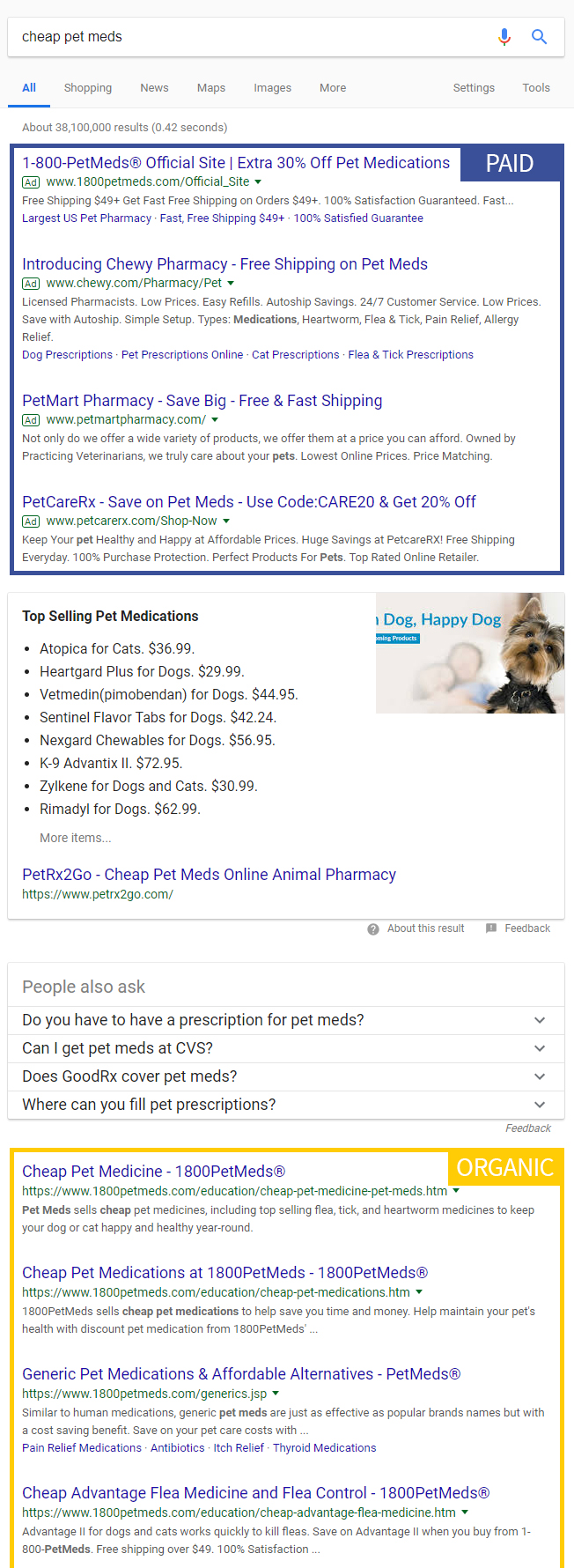
SERP
SERP stands for Search Engine Results Page. It is the page that occurs with the results after you perform a search. There are typically ten organic listings on each search engine results page.
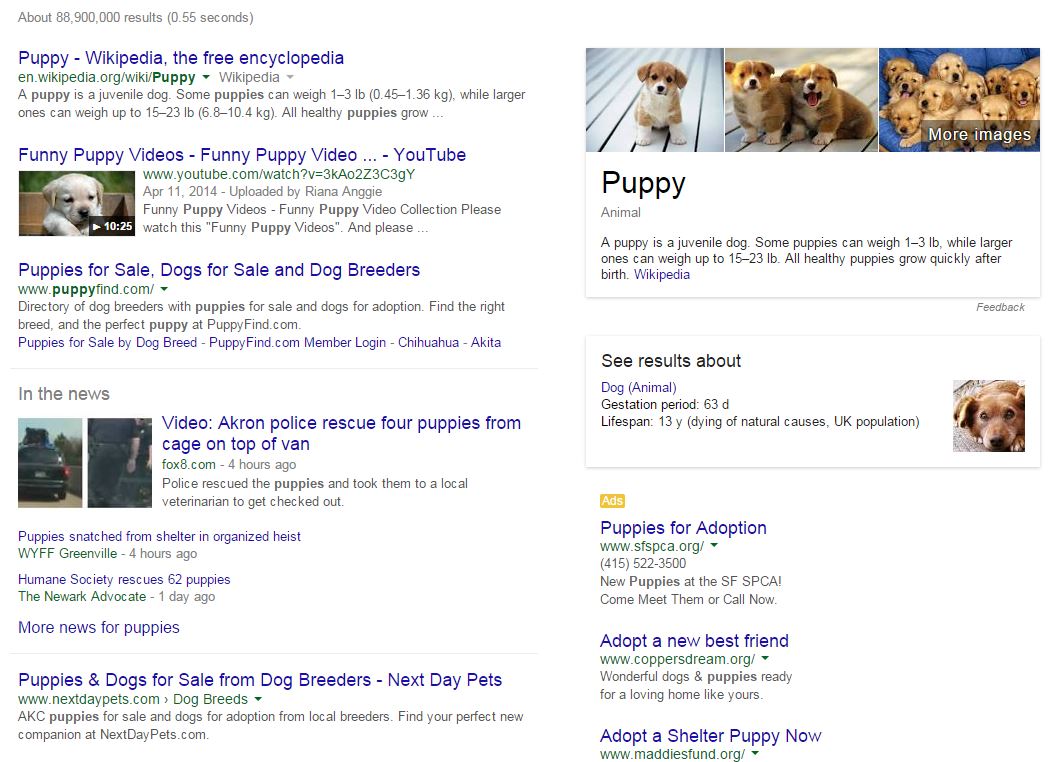
White Hat and Black Hat
White Hat and Black Hat are opposite types of SEO tactics. White Hat strategies follow the rules and guidelines set forth by search engines and are the most beneficial long-term. Black Hat tactics are frowned upon. They are intentionally sneaky and meant to trick search engines. Black Hat strategies aren’t long lasting as search engines are constantly changing algorithms to improve search quality.
Why Does Everyone Focus on Google?
According to comScore, over 64% of search queries come from Google. Since the vast majority of searchers are using the Google search engine it makes sense to focus on Google.
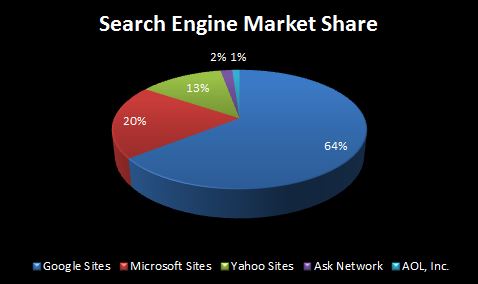
With that being said, over 20% of search queries do come from Microsoft products so you certainly shouldn’t ignore Bing. However, Bing and Yahoo generally have similar rules and guidelines to Google so by catering to Google’s standards you are likely setting it up to rank higher on Bing and Yahoo as well.
How Do Search Engines Work?
A search engine has an organized index of content. You can think of it as a library. The search algorithm acts like the librarian. When a book request is made to a librarian, the librarian attempts to select the book that is the best fit. Similarly, when a search query is made in a search engine, the algorithm attempts to provide the most relevant and useful results. The search algorithm sorts through the content every time a search query is performed.
The search engine is always trying to find new ways to provide the perfect match to every search. That is why some searches return pictures, videos, and maps. The ideal result varies depending on the search.
And this system is constantly getting better and better. That is why the search algorithm is always being changed. It is being improved in order to return the best search results possible.
If you want more information on how search engines work, go directly to the source. Google has put together an incredible video providing a behind the scenes tour of how Google search works. It is both entertaining and informative.
Pages are Ranked, Not Sites
It’s good to know that SERPs list web pages, not sites. This is important because it means that every page matters. This gives you many more opportunities to rank for different keywords, since each group of keywords can have a particular page associated with them.
Relevance is Key
It’s important to remember that relevance is key in the search engine’s eyes. When a user enters a keyword, the search engine wants to display results that are relevant to that keyword. Similarly, when the user clicks on a link the search engine wants the contents of that page to be relevant to the text displayed on the result and the original keyword.
Learn SEO for Free
As mentioned earlier, there truly is an abundance of free SEO resources online. Some of them are better than others and it can be hard to weed through them all, especially when you’re first starting out. Here are a few resources that I personally find to be the most useful if you’re looking to learn SEO for free.
Whenever possible, I find it best to get my information directly from the source. Though it isn’t extensive information, Google does provide documentation on how to make your site “Google friendly”. They also offer Webmaster Guidelines Best Practices.
It’s worth the time to read through both of these so you get a clear understanding of what’s important to Google.
Moz
Moz has excellent resources for learning SEO. Though every MOZ resource really is beneficial, I would start out with the Beginners Guide to SEO. The guide has a nice A through Z overview on everything SEO related.

Neil Patel
Another great resource is Neil Patel. He offers a lot of good SEO knowledge as well as broader digital marketing information and is even responsible for the UberSuggest tool. Neil Patel offers several free digital marketing video courses including one specific for SEO called SEO Unlocked.
ClearPath Online SEO Course
The How To Do SEO Yourself course offers a free step-by-step program to teach you how to grow your site with SEO even if you have no prior experience. It’s self-paced and includes several templates to help create a simple system.
Where to Focus Your SEO Efforts
Google has stated that there are over 200 ranking signals. Though there is some suspicion as to what those 200+ ranking signals are, there is not a definitive list from Google and signals are subject to constant change.
If you aren’t sure where to start, you can always begin with an SEO audit. In no particular order, the following aspects of SEO are the ones where I choose to direct my focus.
Keyword Research
Keyword research is a good place to start. It will help you make decisions when it comes to content and on-page optimizations. Performing keyword research will ensure you aren’t wasting your time when writing content. Instead, it allows you to focus on topics people want to hear about.
Performing keyword research doesn’t have to involve expensive tools. Here is a simple keyword research system you can follow. It includes a Google Sheets template and uses non-paid tools and resources anyone can access.
On-Page Optimizations
There are several elements on your web pages that can affect search rankings. Some of the main on-page elements that can and should be optimized are meta tags and html elements such as title tags, header tags, and image alt tags.
If you’re looking for a tool to audit your current on-page elements, I’d recommend Screaming Frog. With Screaming Frog you can easily see your on-page elements as well as the length and pixel width.
Another great tool to identify on-page optimization best practices is Bing Webmaster Tools. And it’s completely free. Bing actually offers a URL Inspection tool in their Webmaster Tools. You enter any URL on your site and it identifies SEO and indexing issues.
To learn more about on-page elements, view the on-page optimization checklist.
Content
As mentioned earlier, the SERPs display web pages (not sites) which makes the content (including blogs) very important. With that being said, it’s also important to know that high quality content is far more important than quantity.
You can use your keyword research to identify topics that are important to your niche and build out relevant pages corresponding to those terms. You can also generate content ideas based on audience feedback. What are the most common questions you get? What do you hear people struggling with? Write content to support their needs.
Sometimes you can even find a few ideas from tools. You can use the HubSpot Blog Topic Generator or Portent’s Content Idea Generator to try and trigger some ideas.
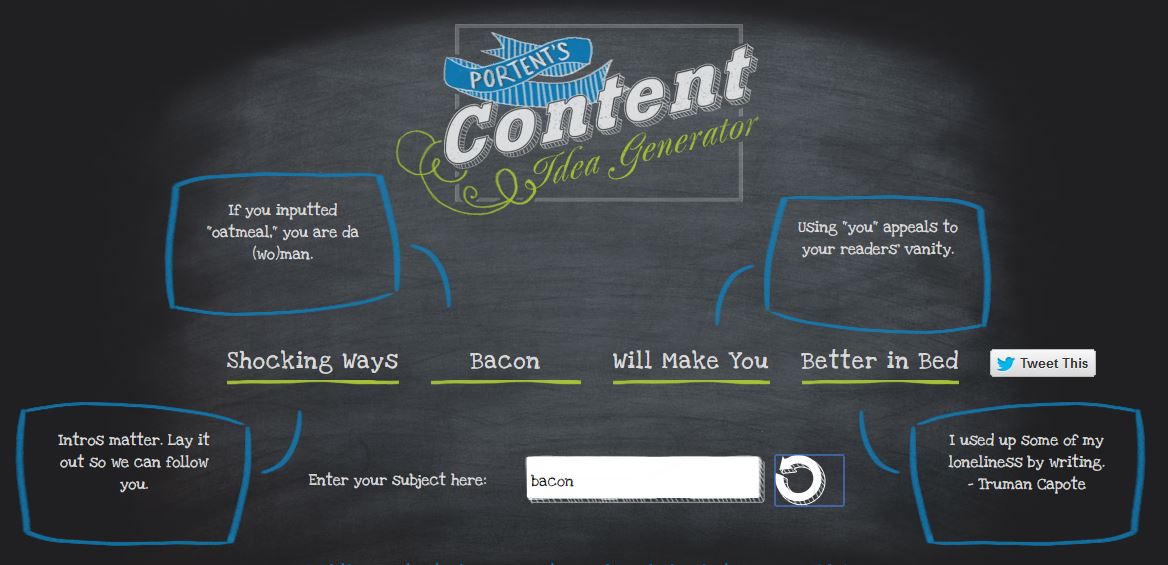
When creating content, spend extra time writing the title. The title is one of the most important pieces of your content because it is one of the primary factors as to whether or not the article will be read. We’ve put together a 7 step system you can follow to create a catchy title for your content.
When it comes to creating content for SEO, remember to focus on the reader. Don’t get too carried away with SEO best practices. It’s more important to create interesting and valuable content for your ideal reader.
Backlinks
Backlinks are both important for SEO and difficult to obtain. Like the content, it isn’t the sheer volume of backlinks that is important, but rather the quality. The best backlinks come from authoritative, relevant sites.
There are several link building strategies you can use. Yet, I don’t focus on building links. It’s extremely time consuming and I’ve found it isn’t a good use of my time. I focus on building high quality articles and then get the word out naturally to anyone following my brand. That is primarily through email and social networks. This does slowly build up links. It is a long process but it is the result of efforts that I would be doing either way.
Page Speed
Google has stated that page speed is one of the many ranking factors they use. There has been page speed research done which shows that the particular page speed metric Google measures for ranking purposes is Time to First Byte (TTFB).
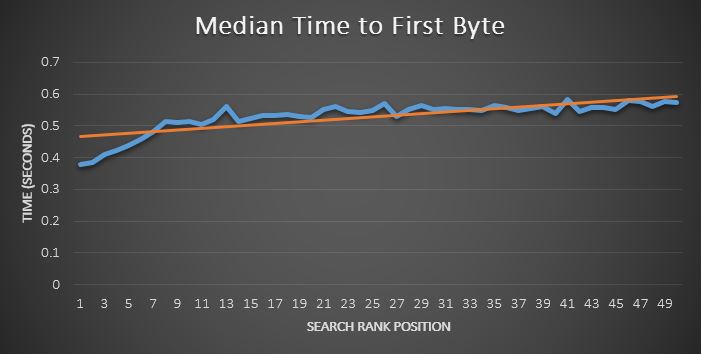
Furthermore, optimizing page speed is always a good idea because it leads to a better user experience.
Some of the best tools to measure and optimize page speed are:
Technical
There is a whole slew of technical SEO aspects that are worth your attention. Some of the main ones include an XML sitemap, robots.txt file, the URL structure, schema tags, broken links, and HTTP status codes.
A good tool to use for many of the technical aspects is the Google Search Console. Within the Google Search Console you can upload your sitemap, view what is being blocked in your robots.txt file, create schema tags and check current tags for issues, and find crawl errors caused by broken links and 404 error codes.
A nice tool to easily identify broken links on your site is Broken Link Checker. As a side note, this tool can also be used on sites you don’t own. You can then reach out to the site owner and offer a replacement for the broken link with a comparable link to your site.
Another important piece of technical SEO is identifying any penalties that have been placed on your site. You can check the Google Search Console and Bing Webmaster Tools for any manual penalties, but they won’t notify you of algorithmic penalties.
Some tools to try and identify if your site has been affected by an algorithmic penalty are:
Google has recently added more emphasis to the importance of SSL and domain security. Having an SSL certificate can boost your search rankings, though not substantially. To check the security status of your domain you can use the SSL Server Test tool.
Mobile
Google has a mobile-first index. Your ranking is determined by your mobile site. If your site isn’t mobile friendly it won’t rank as well.
There are several different ways to make your site mobile friendly. Google’s preferred methods are amp or responsive design. Google actually offers an entire guide on making your site mobile friendly and mobile SEO best practices.
The most important thing to keep in mind is any URL should be providing the same value and content to the user, but in an optimized output based on the device viewing the URL. Mobile users don’t want to automatically be sent to your home page, they intend to reach the specific relevant topic that matches their search query.
Listen to the Search Engines
When optimizing your site for search it’s important to listen to the search engines. Both Google and Bing offer webmaster tools. These tools are essentially the search engines attempting to communicate with you. It’s important to verify your sites within the tools so you can listen to the feedback you’re receiving directly from the search engines.
Stay Current on SEO Knowledge
The world of SEO is constantly changing and evolving. If you really want to learn SEO, you’ll have to continuously educate yourself and stay up-to-date on SEO. To fully understand SEO you must immerse yourself into the industry.
This is a complete list of my favorite SEO resources.
Make SEO Changes that Won’t Become Outdated
At the end of the day your SEO changes should make sense for your community. If you want your SEO efforts not to become outdated, focus all changes on what is best for your audience. The search engines are doing everything they can to provide the best results and best user experience. If you have the same goal in mind, any algorithm changes in the future should only help your site and not hurt it. If your website has a page that is truly the best option for that user, then search engines will eventually rank it higher than all other options.
Do you want to listen to this article? Here’s the podcast episode:
